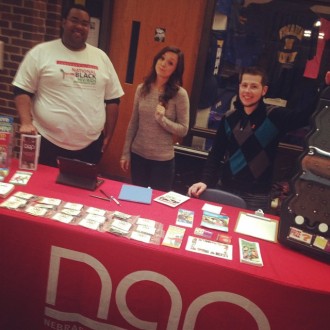National Black HIV/AIDS Awareness Day
By Andrew Aleman
February 7th marked National Black HIV/AIDS Awareness Day (NBHAAD). Nebraska AIDS Project had the opportunity to partner with several local agencies to bring an awareness day event to North Omaha. I had the privilege of representing NAP on this planning committee. Working alongside individuals and agencies that do such amazing work in the community was exciting and inspiring!
North Omaha Community Care Council sponsored this year’s NBHAAD event, bringing over 150 community members to Omaha North High School. During the event, members played “Price of Life” which challenged attendees on their knowledge of HIV/AIDS related facts. For example, Black adults and adolescents (13yrs & up) make up 44% of new HIV infections in the U.S. each year, yet we only represent 12% of the U.S. population (CDC, 2014). That’s crazy! According to CDC, in 2012 approximately 22,581 Black people were diagnosed with HIV!
Panelists made up of community members committed to fight the fight against HIV/AIDS discussed barriers they have found in the community. Stigma was at the top of their lists. One panelist described her memories as a child when her parents were diagnosed with HIV. She talked about how difficult it was for her family to watch close friends, church members, and even people within the family treat her parents differently. People wouldn’t use the same dishware, even though HIV can’t be transmitted that way, people would try to avoid coming to their house, even though just being around someone or kissing and hugging them can’t transmit HIV either. The other big barrier was the willingness for people to talk about the effects of HIV within the community. One panelist stressed that before change can occur, the conversations have to start. He pointed out that as a community we talk about the impact of gun violence, diabetes, and cancer but we are not talking about the impact of HIV/AIDS, which is 100% preventable.
Probably the most touching and emotional part of the event was when two community members who are HIV positive stood up to tell their stories. Neither of them had publically discussed their experiences, but they knew they could make an impact. They each talked about their awful experiences with stigma, so bad that they lost contact with people they truly care about and love. They both talked about the importance of using protection, getting tested, and knowing your status. Finally, they stressed the importance of HIV conversation, which provides people the opportunity to discuss the heavy impact of HIV. Later they embraced, not knowing each other prior to this day, feeling proud of themselves that they may have saved even one person from ever hearing the words, “You have tested positive for HIV.”
The great Maya Angelou once told Oprah Winfrey, “When you know better, you do better.” I firmly stand behind this saying. There will be a day where we know better and no longer treat people living with HIV/AIDS like we did those living with leprosy. There will be a day where we can comfortably talk about the effects of HIV/AIDS among those we care deeply about in our schools, churches, and places of employment. So, why not start today? Take some time to learn even one new thing about HIV and do your part to reduce stigma. After all, “When you know better, you do better.”

